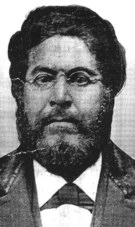Working for Higher Education: Advancing Black Women’s Rights in the 1850s
George B. Vashon
At the National Convention of 1853, 140 delegates including George Boyer Vashon gathered to discuss the rise of successful Black people across the nation and strategies to continue to raise the quality of life for Black people. The delegates discussed education as one of the primary ways to uplift the community. George Vashon was one of three members of the Committee for Manual Labor School, which issued its report to the 1853 Rochester Delegates in support of such a school.[1]
At the time, vocational education was viewed as a practical resource for Black men because severe systemic racism made it almost impossible for them to get jobs that do not include manual labor. However, most of the delegates were Black male professionals that became successful without the use of vocational education. Vashon was one of them; a lawyer, educator, and one of the founders of Howard University Law School, Vashon was born into a family that highly valued education. He grew up in Pittsburgh, Pennsylvania, where his father, John Vashon, established a public school for Black children in the basement of the Little Bethel Church. George B. Vashon and Martin R. Delaney both attended the school. To insure that young Black men were given equal educational opportunities, John B. Vashon created this school and upon his death, George B. Vashon sought to do the same. George Vashon soon became the first Black graduate of Oberlin University and went on to pursue his law degree.
However, Vashon’s admission to the bar in Pittsburgh was denied twice.[2] Vashon left the United States and went to practice law in Haiti. When he came back, he was given the right to practice law due to special circumstances. In his later years, he taught Mathematics and English at Howard. George B. Vashon supported the Manual Labor College, but he felt it was important for Blacks to be trained as intellectuals. Vashon focused on how Black individuals should look beyond what vocational education promised, and he wanted them to realize opportunities to become professionals through formal education.
References
[1] “Proceedings of the Colored National Convention, Held in Rochester,” 30-39, accessed on coloredconventions.org.
[2] “George B. Vashon” The Anti Slavery Bugle, 11 February 1848, Chronicling America.
Credits
Written by Emma Cones. Taught by Sharla Fett, History 213, Occidental College, Spring 2016.
Edited and revised by Samantha de Vera

